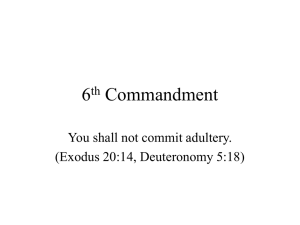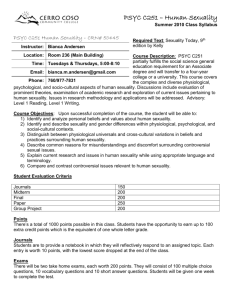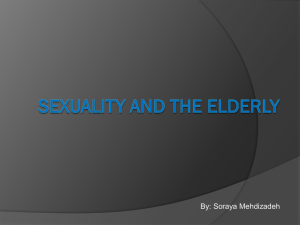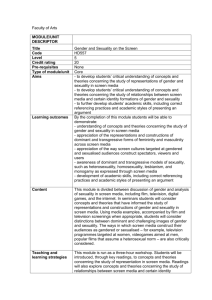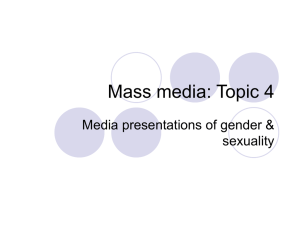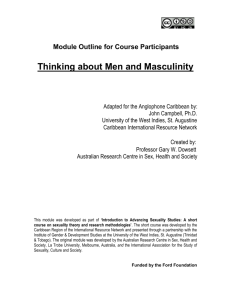weber - Caroline JS (Kay) Picart Homepage
advertisement
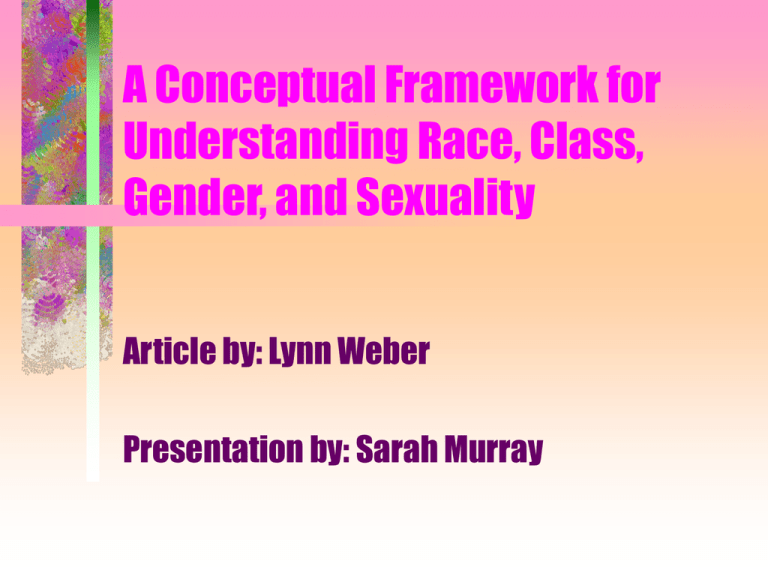
A Conceptual Framework for Understanding Race, Class, Gender, and Sexuality Article by: Lynn Weber Presentation by: Sarah Murray I. Outline/Aims……….2 minutes II. Activity……….4 minutes III. Common Themes……..13 minutes A. Contextual B. Socially Constructed C. Systems of Power Relationships D. Social Structural and Social Psychological E. Simultaneously Expressed F. Interdependence of Knowledge and Activism III. Construction of Masculinity…..3 minutes IV. Conclusion/Questions……2 minutes The aims of this session are as follows: first, to understand the common themes in race, class, gender, and sexuality scholarship, second, to think about how to apply these concepts to everyday life, and, third, to understand the modern construction of masculinity. Think of a Coal Miner…... “Race, class, gender, and sexuality are historically and globally specific, socially constructed power relations that simultaneously operate at both the macro and micro levels of society.” - Lynn Weber Great! So what does that mean? The meanings of race, class, gender, and sexuality vary across historical time periods and geographic regions during the same time period. For example, during the Reconstruction Period, the ideal white male was strong and stoic. The ideal white woman was nurturing and full of emotion. However, the “good” black man was silly and happy-go-lucky, and the ideal black woman was the asexual “Mammy” figure who had no family of her own and was emotionally very strong.* Are these ideals still relevant today? - “Race, Gender, sexuality and class are social constructs.” - Dominant culture defines race, gender, and sexuality as polar opposites to create social rankings. - e.g. White, Non-White; Heterosexual, Homosexual; Male, Female; Good, Bad; Worthy, Unworthy - By claiming that this is part of nature or biology, dominant groups justify this polarization. - Weber claims that, upon examination, race, gender, and sexuality are not based in polar opposites or biology but in group struggles. -What about social class? - Social class (in the U.S.) is not viewed in the same way as race, gender, and sexuality. In fact, it is viewed as a ladder that people can climb up or down based on talent and effort. However, it still justifies dominance and hierarchy. How??? - Race, class, gender, and sexuality are socially constructed hierarchies of domination - they are power relationships. -This is based on the concept that one group controls another group and, therefore, secures its position in the system. Because of this, the dominant group secures wealth, income, and access to healthcare and education (social resources).* - We cannot forget that race, class, and gender relations have meanings at the psychological level of individual’s lives as well as the community and social level. - Progress against discrimination begins at the level of individuals who refuse to internalize the distorted images of their group as portrayed by the dominant media. -The individual psychological resistance to the ideas of the dominating group leads to social structural changes. -e.g. Civil Rights Movement - Race, class, gender, and sexuality all simultaneously exist in every social situation. - Nearly everyone is in both dominant and subordinate groups and experiences advantages and disadvantages because of this. No one is a pure oppressor or victim. - Advantages and disadvantages in one area may not be the same as in another, but, if we understand the ways in which we are disadvantaged as well as privileged, it will provide the foundation necessary to work together with other groups to equalize distribution of society’s resources.* -What dominant and subordinate groups do you belong to? - The only real value of knowledge is to empower subordinate groups, and, indeed, all social groups to seek “social justice” and equal distribution of resources. What is a “real man”? -Dominant culture portrays working-class males as valuing physical strength more than intellectual prowness. They are also seen as being stoic, aggressive, and dominating over women. -When these men are athletically talented, they are encouraged to pursue a career in sports. - These males are usually stereotyped as white. They are deemed superior to working-class males because of their positions of power in the labor force, greater income, intellectual prowness, and, surprisingly, emotional sensitivity. Notice that physical strength is not necessarily what makes him superior. - When these males are athletically talented, they are encouraged to pursue sports only to build character. 1. Are there true victims or oppressors? (T/F) 2. ______ ________changes lead to _______ ______ changes. 3. What does it mean when we say that the meanings of race, sexuality, class, and gender are contextual? 4. Dominant culture defines race, gender, and sexuality as ______ _______ to create social rankings, and justifies this by claiming that it is part of _______.


